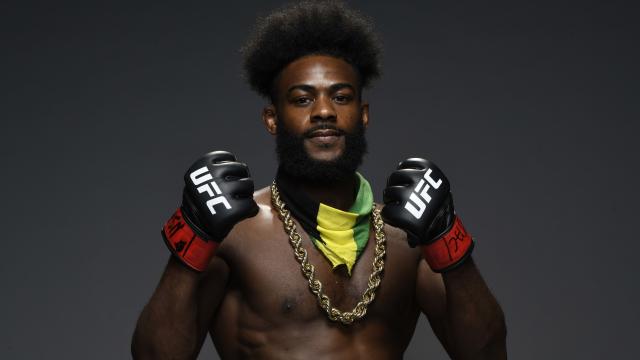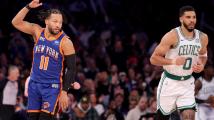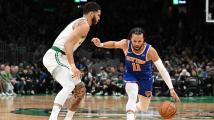Aljamain Sterling previews title shot vs. Petr Yan: 'It's a dangerous fight, it's a chess match'
UFC bantamweight contender Aljamain Sterling believes experience will play a major role in his fight versus bantamweight champion Petr Yan at UFC 259 on Saturday, March 6, 2021.
Video Transcript
[STADIUM CHEERING]
[THUD]
KEVIN IOLE: Hey, folks. I am Kevin Iole of Yahoo Sports. Welcome back. And my guest on the channel now has a chance to set a record of some kind. He could be the second fighter from the BombSquad to become a UFC champion, Aljamain Sterling. Aljo, how's it going?
ALJAMAIN STERLING: Doing well. I'm excited for everything right now. I'm just happy-- happy in the moment and just enjoying life, taking things one day at a time.
KEVIN IOLE: Well, on March 6, you will have one punch at a time because you're going to be going up against the new bantamweight champion in the UFC at UFC 259, Petr Yan. That is one of three title fights on that card, which we're really looking forward to.
Let's start with this. Were you impressed with Petr Yan's performance in the title-winning effort over José Aldo?
ALJAMAIN STERLING: Yeah, I was impressed. I guess-- I've said to this before, I think Jozé Aldo still has some fight in the gas tank, and I think he's still got some good tools, some good weapons. I think there was some familiarity there between the two of them because they used to train together in the past. And I think Yan showed him that he's no longer that young buck that he was training with back in the days in Brazil. So--
KEVIN IOLE: Right, a little different kind of guy now, so, yeah, exactly.
ALJAMAIN STERLING: Yeah.
KEVIN IOLE: You know, you got the-- the fight by an unbelievable win over Cory Sandhagen, who just now comes off a big win over-- over Frankie Edgar. Were you at all concerned? Like, when that-- when that happens, there's all that uncertainty that's going on. We never knew when you guys were going to fight. Did you have that period of time, Aljo, where it was like, what happened here? Am I-- is this going to happen? You know, and did you feel like you might have to fight another time to get your title shot?
ALJAMAIN STERLING: I wasn't sure. I felt like for some reason, at least the way it felt, it felt like the company was trying to find a different angle to use for a different person to slide into that title shot situation, that title shot picture. And, fortunately for me, things worked out where Sandhagen did prove he is as advertised and he is as good as he says he is. And that-- that fight with me and him wasn't just a fluke win, you know.
He came back and bounced back in a big way over a guy who beat me three years ago. You know, people still-- people still talk about that fight that happened three years ago as if I'm supposed to be the same exact fighter from three years ago.
KEVIN IOLE: Right.
ALJAMAIN STERLING: Which is fascinating. I really don't understand people, but the logic is mind blowing. So that was really cool. But so for that to happen, all the pieces kind of just fell into place, and it ended up working out in my favor.
KEVIN IOLE: You know what I do, though, when I look at a fight like that, I always look at what happens next, right? And, you know, so to me, like, what you did is you showed who you are as a fighter. Because you turn around and you win five in a row, you know, Brett Johns, Cory Stamann, Jimmie Rivera, Pedro Munhoz, and Cory Sandhagen. And those last three are quite a hat trick, right? I mean, you know, not to diss--
ALJAMAIN STERLING: [INAUDIBLE]
KEVIN IOLE: --Brett Johns and Cory Stamann. But, you know, those last three guys are pretty-- pretty impressive fighters. So I always look at what you do after you have that kind of loss, not the fact that you lost, but how you responded. Is that sort of how you look at things? Like, OK, if I faced adversity, how do I respond to it?
ALJAMAIN STERLING: Yeah, 100%. I think that's what life's all about. It's how you handle the good times and the bad times, man. This sport is so crazy because it's the highest highs, the lowest lows. And you really wouldn't understand that unless you jump into the sport yourself to see what it actually feels like.
It's one thing to be a teammate of somebody, but it's another thing to actually be the fighter and know what it feels like to have a devastating loss, or a big loss, or a knockout submission loss, whatever the case may be, and to just feel like your world is kind of crumbling around you, you know. So kudos to the people who can bounce back because I think it really shows stuff about your character and shows your self-belief in how much you really want something, you know. It's so easy to just pack it in and say I'm done.
KEVIN IOLE: Right.
ALJAMAIN STERLING: It's a lot harder to dust yourself off and get back on the horse and figure out a way to make things work for you.
KEVIN IOLE: I think it's human nature. In the immediate aftermath, sometimes you say screw it, right? And you're just-- did you have that? Did you ever have that where you said screw it, and then you kind of realized later, OK, Aljo, that's not the way to do this, and let's come back the right way.
ALJAMAIN STERLING: Uh, no. I don't think I've ever had a moment where I was like, yeah, I'm done with this or-- I don't-- not that I can remember. That's not really my persona. I don't really have that in my-- my genes, you know? It's-- I have a weird way of fueling myself when I'm training, and it's-- it's almost like a negative self-talk, where I'll say something bad about myself in terms of, like, asking a question.
Like, what are you some type of [BLEEP] or some type of [BLEEP]? You're soft or you're weak. And then that would help flip a switch where it was like, it feels me to go harder and say, yeah, right, this is what I got. I'm tougher than this. I can keep going. I can keep pushing.
It's a weird-- it's a weird way how I make things work. People say sometimes I have a weird way of showing my support because I do it in such an awkward way, like that. It's like, I say this, where--
KEVIN IOLE: You're looking for a response.
ALJAMAIN STERLING: Yeah, so I'm saying it to fuel myself, but they're like, well, you could say it in a much more positive way. But I'm like, no. This is what makes me, me. It's just-- it's just different.
KEVIN IOLE: You know, I alluded to in the beginning you training at the BombSquad at the beginning of your career with Jon Jones. And Jon went on to be arguably the greatest fighter who ever lived. Go-- take me back to the BombSquad days. Like, what was it like, A, looking at Jon Jones pre UFC? And what were you like as a fighter back then? I mean, did you have a vision that someday you would be sitting here on top of the UFC, you know, fighting for the UFC championship back in those days?
ALJAMAIN STERLING: Yeah, 100%. When Jon first started, I was still wrestling, so I didn't really train. But then after that season of wrestling was done, I came out, trained for a month, and then took my first amateur fight. I think he had just gotten into the UFC at that time, too, and he was kind of just discovering Jackson's and going back and forth to New York, Ithaca, and down to Albuquerque.
And it was-- it was cool to see him have the success he had because I went to school with him for half a semester at SUNY Morrisville, and than when he tran-- when he dropped out and I transferred, he was training down the block. I just saw his pictures on Myspace, and I was like, this looks interesting. He was doing, like, jiu-jitsu moves. I didn't know what the moves were called. I was like, that looks like a pretty sick submission. And he was doing all those things, and I thought it was very interesting.
So I messaged him. He gave me the OK to come down to his gym. I came out, and ever since then, I just never stopped training. So it was always cool to see him become the youngest UFC champion, and I always thought that I can do that next and be the second youngest, or even try to break that record. That's what I really, really want to do.
I had a couple of injuries, a couple setbacks, some surgeries, and things like that, and not being able to be as active as I wanted to. Because he was-- he had fights, like, two weeks-- like one fight, and then he had another one on short notice booked like two weeks later. And I don't know how he was doing it. I was like, I can't-- I couldn't, like, cut weight like that to go up and down the way he was doing.
KEVIN IOLE: Right.
ALJAMAIN STERLING: But he was just a freak athlete, man, and super talented, and a student of the sport at such a very young age. So I had influence in that. Like, Jon-- people-- Jon gets a bad rap, but there are a lot of good things about him that you can take away outside of the negative stuff.
He's a student of the game. That's a good trait to have. He works hard. That's a good trait to have. So, yes, he does a lot of crazy stuff outside of the Octagon that's probably shunned upon, but at the same time, he is a guy you can learn some things from in terms of the mindset of a champion. And that's one of the things I always did respect about him.
KEVIN IOLE: I want to ask you this about him, and then we'll get back to your fight with Petr. But, you know, he's going to fight for the heavyweight title sometime this summer against the winner of Stipe Miocic and Francis Ngannou. And I don't know if you've seen any pictures of Jon recently, but he's massive, right? I mean, just big.
And, you know, his two brothers played in the NFL. Arthur was a big defensive lineman, Chandler a defensive end, you know, maybe more of a life body, but still big dudes, right? How do you think Jon is going to adjust, you know, with that big body, right? I mean, he's been so successful-- you know, the tall, lanky, you know, explosive guy that he is. Do you think he's going to have to adjust to his new body as he fights in heavyweight with all that muscle and all that weight on him?
ALJAMAIN STERLING: I think a little bit. But I think he's smart enough to know the adjustments he needs to make. I think the toughest thing for him is probably going to be the weight of the other guys. Like, he's going to be bigger, but he's going to also be carrying bigger men. Let's say Francis were to win. That's a big boy for Jon to fight, who cuts down to 265. Where opposed to Stipe, it's more of a favorable match-up in terms of size.
KEVIN IOLE: Right.
ALJAMAIN STERLING: But maybe in the skill department in terms of boxing, Stipe's got him beat there, but Jon's going to have to reach advantage. So there's a lot of nuances there, for sure. He's used to being the bigger, longer guy. He's going to be faster at the weight class.
But I think the main thing is going to be whether or not him putting on that size and mass is going to translate to him having a little bit more punching power. Or is he going to be willing to sit down on his punches a little bit more to try to end fights? Because we know at the heavyweight division, it only takes one to connect, and that's lights out.
KEVIN IOLE: And the division you're in, you know, I mean, I think when you look at the UFC right now, the strength of the UFC is 35, 45, 55, in my opinion. I mean, you have so many great fighters in those three divisions. So do you look at it like-- I know you have to look at just this one fight at a time. But when you take that overarching view, if you beat Petr Yan, you're in a position to make some pretty good cash, right? Because there's going to be a lot of good fights coming up for whoever the champion is after-- after March 6.
ALJAMAIN STERLING: Yeah, there is-- I'm happy where things are at right now. I got a good contract. I'm happy that I'm not really fighting for-- I am fighting for money, but that's not, like-- that's not, like, the driving factor anymore. Like, I'm set. I got-- I got three houses. I got a good savings account. I got money I can spend.
You know, so, you know, I did well, saving my money, not going crazy like some of these other guys blowing all their money. And I learned from other people's mistakes and learned about how to invest for your future. So I'm glad I've learned those lessons. But in terms of big fights coming up, there are a lot of big and interesting fights coming up, for sure. And I can't wait to be a part of it.
It's going to be interesting to see how everything shakes up and plays out. And I agree. I think the 35, 45, 55-pound division is probably the hottest. And I do think the heavyweight division is getting better because they are finally adding some youth to the division. The guys are starting to get younger in that division.
KEVIN IOLE: They're big punchers, right?
ALJAMAIN STERLING: Big punches, yeah. So it's starting to get a little bit more exciting, where before it was the same guys who-- from, like, 34 to 42. So it was kind of crazy. But for us, we've got all these young guys who are going to be around for a while and all this other young blood coming up. So I think it's a good time for everything. And I'm just excited that I'm-- I'm a part of this. Like, I'm a part of this era. Like, all of us are in the mix right now.
KEVIN IOLE: Sure. You know, you referenced you have three houses, and you saved your money, and everything, and that's so good to hear. Because, you know, you hear of the-- you know, Mike Tyson's the most famous one, but, you know, ESPN did a big 30 for 30 on it a few years ago, athletes who lost their money.
So first of all, when you say you have three houses, are you renting two of them out, or are you living in three different places? What's going on there?
ALJAMAIN STERLING: I'm renting my primary in New York. I'm renting a bit of my mom's house as well. And out here, this is the only one that's not really being rented.
KEVIN IOLE: Out here being Vegas.
ALJAMAIN STERLING: Yeah, yeah. So this is the only one. So once I figure this last piece of the puzzle out, then everything will be set in terms of, like, security, you know--
KEVIN IOLE: Sure.
ALJAMAIN STERLING: --not just, like, spending money on extra mortgages for no reason.
KEVIN IOLE: So when you have that-- you know, where you know, OK, I have the rental income coming in. I have other side money, you know, where you don't have to get punched in the face or kicked in the head to make it. Does that make you a better fighter because you don't have to worry?
Like, you know, there's some guys that are feeding their family off of what they make in fighting. You're not doing that at this point. You know, you have income coming in. Does that make it any easier for you just to focus on Petr Yan and whoever else you're fighting and not worry about, you know, the business aspect of it?
ALJAMAIN STERLING: Yeah, for sure. I don't feel like I need to take a random, stupid fight just because I need to say, I need-- I need to make money. I've got to make money right now. So that's nice, and it gives me security to know that I can do other things on the outside and then still get ready for a fight in a little bit more comfortability.
You know, before it was more like, I just didn't do anything. You know, I was eating peanut butter and bread sandwiches and eating eggs three times a day, throwing chicken in the oven, and that was it with no seasoning, things like that. Just like the very bare minimum of getting by, eating McChickens for dinner, like all the stuff I did coming up.
I mean, I would imagine a lot of fighters have similar stories. And I think that's the thing that you come to appreciate when you do actually get a little something. It's-- it's rewarding. But, you know, you've got to be smart about it. You can't just get in and feel like you've never made something before. You've got to act like you've been here before. Act like there's more to come, and kind of treat it as such so that you don't just run through everything out of excitement.
So I've learned a lot through the years. And it's good to know you don't have to fight just to fight. You know, I like fighting, so I'm going to keep fighting because I make good money. So I want to keep fighting. But I don't have to fight just to take a fight. Just to say, hey, I just want to fight. Like, it doesn't work like that anymore for me. So I'm happy about that.
KEVIN IOLE: I see your shirt, VaynerSports. Obviously you're-- Gary Vaynerchuk created that. You know, and he's-- he's an entrepreneur that's very well known. You know, kind of they were surprise-- he was surprising to get into the sports business. What have they been able to do for you, and how have they changed your life since you've been represented by them?
ALJAMAIN STERLING: They've helped me with my-- my website and stuff like that. We've been working on some different ideas for content creation. And, as we know, Gary V's a big content creator guy, so it's good to have his knowledge in that space. And they're looking to do a lot more things. They have some stuff in the works for, like, real estate, stocks, and all that stuff.
So it's good just to see where everything can go when you have someone like that at the helm. And I'm excited to be a part of this and see where-- where we can go with everything. So I've expressed my interest in acting and other stuff, real estate.
KEVIN IOLE: Wow. Good for you.
ALJAMAIN STERLING: Yeah, so I'm one of those guys who just likes to stay busy. I can't just be home doing nothing all day. That's just not my style.
KEVIN IOLE: I want to ask you this, your opinion of this. You know, there's-- the UFC comes under some criticism periodically when-- you know, usually when boxing purses get announced, right? Where, you know, somebody in boxing is making this multimillion-dollar purse, and then the UFC comes under criticism for what-- you know, for what you guys get paid.
And the UFC is an organization that does not want to release what you make. So I don't know what you're making to fight Petr Yan, where in boxing that's usually a known commodity. Do you feel like, you know, you're being treated fairly, and especially in comparison to your boxing counterparts, who tend to not get the TV ratings or the Pay-Per-View sales that you guys get?
ALJAMAIN STERLING: They don't get the sales and Pay-Per-Views that we get?
KEVIN IOLE: I don't think they do. I mean, maybe for, like, the biggest of the big, right? But on a consistent basis, on a week-to-week, month-to-month basis, no.
ALJAMAIN STERLING: Well, that is actually new information for me. But it's good to know. You know, everybody would like to get paid more. For me to sit here and say, like, I don't want to get paid more would be complete [BLEEP]. But yeah, I guess when you do see other people making a lot more than you, you kind of want a piece of that as well. Because obviously when you do get paid more, you could do a lot more things, and not just for you, for other people.
So that's kind of my mentality with making more money. It's not like making more money so that I could go buy fancy cars and things like that. That's not really-- that's not my-- that's not my MO. So it would be nice. To say getting treated fairly, I mean, the UFC has done well by me so far. You can say all the bumps in the road in terms of, like, trying to get a title shot and all the hoops I had to jump through. That could be a little bit frustrating, for sure.
One of the things I can say that I'm fortunate about is that I can make a living. And if it wasn't for them, I wouldn't be in this position that I am today to put my mom in a house. And honestly, that's the biggest thing that I can ever ask for, you know? So we've got-- we've got a whole little situation over here that's different that not everyone knows about.
So for me to be able to have that ability to do that, that's-- that's huge for me. And again, if I could make more money, that would obviously be icing on the cake.
KEVIN IOLE: That's so awesome. A couple other things and we'll let you get out of here. I know you've been doing this a long time. You know, just Chris Weidman, your teammate, he was a world champion. What was he able to tell you or has he been able to tell you about preparing, being ready for that, you know, understanding, you know, what it takes to-- to-- the mental part of the championship, not the physical part so much, but all the stuff that surrounds being a champion?
ALJAMAIN STERLING: We've-- we've talked, like, before fights and stuff like that, but we've never actually talked specifically about that, like what it takes, that type of thing. We've never actually had that conversation, if I'm being completely honest. But before fights, he will give me a call, or he'll text me, and we'll sit on the phone, chop it up for a few. And him just saying a few words of appreciation and mental encouragement, just kind of positive reinforcement and just kind of like, believe in yourself and going out there and getting it done, everything you've worked for kind of thing.
And that's always been good, always been helpful, especially for a guy like that who's been at the top, you know, and knows what it's like when you do get there. It's not easy, man. This is a very physical--
KEVIN IOLE: Yes.
ALJAMAIN STERLING: --physically demanding and mentally demanding sport. It's a grind in so many different aspects. So to have a guy like that around you who can help you out and give you some insight on things is always going to be a big help.
KEVIN IOLE: When you-- you know, he won the title from Anderson Silva, which, you know, from a mental standpoint had to be a huge thing because obviously Anderson was on such a roll and was a dangerous striker. And I wonder, like, when you look at it, you're fighting a guy that, you know, knockout puncher, you know, big guy.
And would you rather be fighting a guy like that, or would you rather be in a grap-- you know, with a grappler, a guy who could get in there and grapple with you? I know that's your expertise. You know, if you had your pick and everything went the way you wanted, you know, do you favor one over the other?
ALJAMAIN STERLING: I would much rather fight a strike. I think grapplers are harder to prepare for, especially if they're good on the ground. It's a more challenging chess match because you almost neutralize what you're both good at.
KEVIN IOLE: Right.
ALJAMAIN STERLING: I think, personally, fighting a grappler is a lot more exhausting than fighting a striker.
KEVIN IOLE: Right.
ALJAMAIN STERLING: That's just my personal opinion.
KEVIN IOLE: I think a lot of people would agree with you on that. Finally, let's-- you know, just a couple quick seconds on the fight itself. You know, in your opinion, what do you have to do to beat this guy? I mean, you know, Petr has, you know, been on a roll, not only winning the title, but in the fights before he won the title looked really good and taken apart some really good fighters. In your opinion, you know, where's his vulnerability and how do you take advantage of that?
ALJAMAIN STERLING: I can't really say he's got holes. I just don't think he's been tested in every aspect of the game yet. And I think I've been around a little bit longer than he has, and I think that's going to play a big factor. So we don't really know what it's like for him in terms of diversity yet. So I think that's going to be the difference maker in this fight.
How he does with pressure, him being the one getting pushed backwards, I think that's the main difference. He's a tough dude, man. I know I'm in for a tough fight. I could make one wrong move and things can go badly. And I could do one right thing, and he can miss a big shot, and he could end up on his back, and things could go badly for him. So it's a dangerous fight. It's a chess match. And I like it. I like-- I like where things are going for me.
KEVIN IOLE: Well, I like talking to this young man, Aljamain Sterling. He will be fighting Petr Yan for the UFC bantamweight championship, UFC 259 on March 6 here in Las Vegas at Apex. Aljo, great to talk to you. I know fans enjoy watching you fight. I wish you the best of luck. Thank you so much.
ALJAMAIN STERLING: Thanks for having me.
KEVIN IOLE: Appreciate it, brother.








